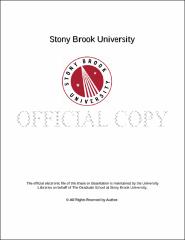| dc.identifier.uri | http://hdl.handle.net/11401/76461 | |
| dc.description.sponsorship | This work is sponsored by the Stony Brook University Graduate School in compliance with the requirements for completion of degree. | en_US |
| dc.format | Monograph | |
| dc.format.medium | Electronic Resource | en_US |
| dc.language.iso | en_US | |
| dc.publisher | The Graduate School, Stony Brook University: Stony Brook, NY. | |
| dc.type | Dissertation | |
| dcterms.abstract | This dissertation addresses the critical issue of establishing and maintaining desired wireless communication connectivity in a team of collaborative mobile robots, which is highly demanded for reliable functioning of multi-robot systems but challenging in realistic environments. The signal propagation of wireless communications among mobile robots is affected by many issues, including the transmission power, distance, obstacles, robot movement, and other environmental conditions, which result in signal loss, attenuation, multi-path fading and shadowing. Consequently, the communication condition among mobile robots in a physical environment is usually unstable, and it is difficult to accurately predict the actual communication ranges of robots. We propose decentralized control strategies which, based on perceived link quality, adopts artificial intelligence schemes to accommodate the fluctuating communication condition, and approach and maintain desired and reliable communication connections among neighboring robots. The intelligent control strategies, such as fuzz logic and artificial neural network, are introduced as our control frameworks, which are tuned and adjusted by back propagation or reinforcement learning. These intelligent schemes are defined for each robot as an onboard controller to adapt to the quality of the wireless links with its neighbors. The combined effect of all robots' movement allows the MRS to achieve the desired communication connections. The effectiveness of proposed intelligent controllers are verified by the simulations or experiments. The advantages and disadvantages of these controllers are compared. Pioneer P3Dx and Amigobot mobile robots are adopted as our experiment platform, which provides dedicated motion controller with encoder feedback. A real-time robust localization algorithm is proposed for mobile robots to avoid accumulate errors from onboard encoders in indoor environments. Proposed localization algorithm is designed based on the recognition of artificial landmarks captured by a single onboard camera. The artificial landmark identity are encoded with nested circles in black and white. The center of landmarks are located by a fast two-phase recognition algorithm in image frame. The absolute position of the camera/robot in the environment is estimated using the geometric mapping between the image and global frames. An application of proposed wireless maintaining controller is explored in a task of deploying multiple robots into a realistic environment. Each robot can perform two categories of behaviors: 1) fundamental behaviors, e.g. forming sensory coverage, maintaining wireless communication connections, and avoiding collisions, are necessary for reliable functioning of the MRS; 2) application behaviors, e.g. search and exploration, are defined to fulfill the goals of specific deployment tasks. In the proposed control architecture, these behaviors are implemented by appropriately-defined parallel fuzzy controllers with different priorities, and behaviors can easily be added or removed by adding or removing corresponding parallel fuzzy controllers without affecting other behaviors. | |
| dcterms.available | 2017-09-20T16:50:19Z | |
| dcterms.contributor | Purwar, Anurag | en_US |
| dcterms.contributor | Zhou, Yu | en_US |
| dcterms.contributor | Ge, Jeffery Q | en_US |
| dcterms.contributor | Wong, Jennifer. | en_US |
| dcterms.creator | Zhong, Xu | |
| dcterms.dateAccepted | 2017-09-20T16:50:19Z | |
| dcterms.dateSubmitted | 2017-09-20T16:50:19Z | |
| dcterms.description | Department of Mechanical Engineering. | en_US |
| dcterms.extent | 147 pg. | en_US |
| dcterms.format | Application/PDF | en_US |
| dcterms.format | Monograph | |
| dcterms.identifier | http://hdl.handle.net/11401/76461 | |
| dcterms.issued | 2014-12-01 | |
| dcterms.language | en_US | |
| dcterms.provenance | Made available in DSpace on 2017-09-20T16:50:19Z (GMT). No. of bitstreams: 1
Zhong_grad.sunysb_0771E_12096.pdf: 2304603 bytes, checksum: 55df49148e10ac5cf8a30dcfd795d615 (MD5)
Previous issue date: 1 | en |
| dcterms.publisher | The Graduate School, Stony Brook University: Stony Brook, NY. | |
| dcterms.subject | intelligent control, multiple robot system | |
| dcterms.subject | Mechanical engineering | |
| dcterms.title | Maintaining Stable Wireless Communication Connections among Multiple Collaborative Mobile Robots by Intelligent Robot Motion Control | |
| dcterms.type | Dissertation | |

